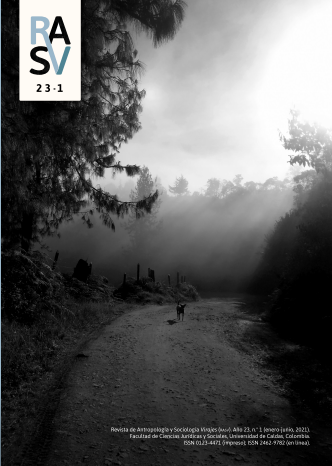Authors
Abstract
In Tijuana, at Mexico’s border with the United States, worn-out old buses connect the urban periphery with one of the busiest ports of entry in the world. These routes make up the lowest strata of the border’s system of mobility; in them, the imperative of capitalist mobility, which the border turns into a supreme value, takes exploitation to an extreme and makes
fragile any incipient solidarity between workers. Amongst them, an impulse towards the “pure gift” emerges: the absolutely disinterested gift that can barely be recognized as such. This impulse takes shape in the contrast between different kinds of time; it manifests itself, importantly, in acts of linguistic communication, which appear as delicate and fleeting gifts.
Focusing on the (non)relationship between the anthropologist and her main interlocutor, this essay uses the ethical complexities of the ethnographic exchange as a starting point for exploring the relationship between time, the gift and communication at the border.
References
Bloch, E. (1977 [1935]). Nonsynchronism and the Obligation to Its Dialectics. New German Critique, 11, 22-38.
Bourdieu, P. (2007 [1980]). El sentido práctico (Trad. A. Dilon). Buenos Aires: Siglo XXI.
Davis, D. (1999). El Leviatán urbano. La ciudad de México en el siglo XX. México: Fondo de Cultura Económica.
Derrida, J. (1995). Dar (el) tiempo. I. La moneda falsa. Barcelona: Paidós.
Derrida, J. (2006). Dar la muerte. Barcelona: Paidós.
Fleming, M. (2016). Mass Transit Workers and Neoliberal Time Discipline in San Francisco. American Anthropologist, 118(4), 784-795.
Hubert, H. y Mauss, M. (2010 [1898]). El sacrificio. Magia, mito y razón. Buenos Aires: Cuarenta Ríos.
Hymes, D. (1974). Foundations in sociolinguistics: An ethnographic approach. Philadelphia: University of Pennsylvania Press.
Laidlaw, J. (2000). A free gift makes no friends. Journal of the Royal Anthropological Institute, 6(4), 617-634.
Limón, J. (1989). Carne, carnales, and the carnivalesque: Bakhtinian batos, disorder, and narrative discourses. American Ethnologist, 16(3), 471-486.
Mauss, M. (2009 [1925]). Ensayo sobre el don: forma y función del intercambio en las sociedades arcaicas. Buenos Aires: Katz.
Paper Boat Collective. (2017). Introduction: Archipelagos, a Voyage in Writing. En A. Pandian y S. McLean (eds.), Crumpled Paper Boat: Experiments in Ethnographic Writing
(pp. 11-28). Durham: Duke University Press.
Parry, J. (1986). The Gift, the Indian Gift and the ‘Indian Gift’. Man, 21(3), 453-473.
Robledo, H. y L. Cano. (2020). De El Hombre-Camión al Frente Común de Usuarios y Operadores. Memoria de una investigación con metodología audiovisual colaborativa. Encartes 3(5), 56-78.
Rosa, J. (2018). Looking Like a Language, Sounding Like a Race: Raciolinguistic Ideologies and the Learning of Latinidad. Oxford: Oxford University Press.
Saussure, F. (1983 [1916]). Curso de lingüística general (Trad. A. Alonso). Madrid: Alianza.
Schieffelin, B., Woolard, K. y Kroskrity, P. (Coords). (2012 [1998]). Ideologías lingüísticas. Práctica y teoría. Barcelona: Catarata.
Thompson, E.P. (1984 [1967]). Tiempo, disciplina de trabajo y capitalismo industrial. En Tradición, revuelta y consciencia de clase. Estudios sobre la crisis de la sociedad
preindustrial. Barcelona: Crítica.
Venkatesan, S. (2011). The social life of a “free” gift. American Ethnologist, 38(1), 47-57.
Villarreal, A. (2010). The Bus Owner, the Bus Driver, and His Lover: Gendered Class Struggle in the Service Work Triangle. Work and Occupations 37(3), 272-294.
Villarreal, A. y D. Mercier. (2010). ¿Hacia un sistema integrado de transporte urbano en el área metropolitana de Monterrey?: La figura del hombre camión. En L. Palacios (ed.), Cuando México enfrenta la globalización. Permanencias y cambios en el área metropolitana de Monterrey (pp. 457-468), Monterrey: Universidad Autónoma de Nuevo León.
Weber, M. (2003 [1905]). La ética protestante y el espíritu del capitalismo. México: Fondo de Cultura Económica.

 pdf (Español (España))
pdf (Español (España))
 FLIP
FLIP



















